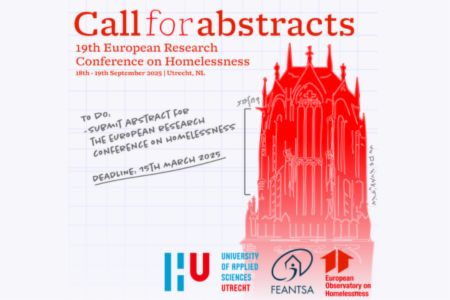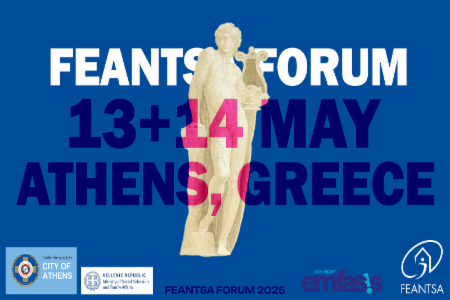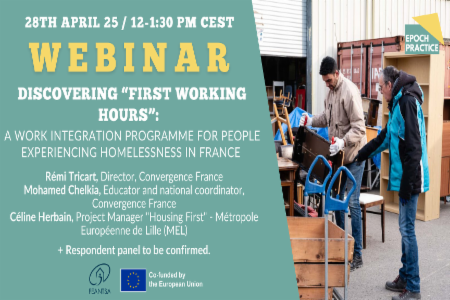FEANTSA Flash: November 2020
Welcome back to the FEANTSA Flash.
This November, with the second wave of the pandemic well and truly upon us, we have seen some governments implementing measures to protect homeless people at a time when their vulnerability is heightened, and others that punish homeless people for their inability to comply with lockdown. At the same time, it has been a very positive month in terms of European policy development on homelessness. Among other developments, a resolution was adopted in the European Parliament to end homelessness by 2030. Read on below.
As always, feel free to get in touch with any ideas or updates that you’d like to be included in the next edition of the Flash.
FEANTSA Events
Right to Energy Forum
FEANTSA is part of the Right to Energy coalition, which aims to raise awareness and affect change in the area of climate change and energy poverty. From 1st-3rd of December, Right to Energy will be running an online forum, which will bring all its members together to exchange knowledge and skills regarding increasing rates of energy poverty in the EU and how to combat this. Find out more and register here.
PRODEC Study Day: Intra-European Migrants and Homelessness in Brussels
FEANTSA have teamed up with Bruss’help and Diogenes to organise a ‘study day’ to discuss the PRODEC study (Protecting the Rights of Destitute EU Mobile Citizens) and explore the link between intra-European migration and homelessness in Brussels.
The PRODEC Session will take place as a conference-debate on the 9th of December 2020 from 14h00 - 16h00. The session will comprise a presentation of the report followed by a debate among European politicians and policymakers. Register here.
A Gender Lens: Seeing The Needs and Realities of Women who Experience Homelessness
Join FEANTSA online on 15th December 2020 (10h30 – 12h00) as we share the latest study on women’s homelessness in Europe and launch our guidance on supporting women who experience homelessness.
Growing international evidence demonstrates that there is a complex, gender-specific dimension to women’s homelessness and a gender lens needs to be applied to any strategy that aims to prevent and to end homelessness for women. In this webinar, Joanne Bretherton and Paula Mayock will share the preliminary findings of the latest evidence review on women’s homelessness in Europe and Dalma Fabian will present FEANTSA’s framework to develop effective solutions to women's homelessness, which will be followed by a response from Mary Collins from the European Women’s Lobby. Register here. For further questions please contact with Dalma Fabian dalma.fabian@feantsa.org.
FEANTSA News
Proving popular – FEANTSA’s webinar series on improving HR support for people in situation of homelessness
Our webinar series on Harm Reduction (HR) support for people experiencing homelessness was a real success with 120+ participants from all over Europe who signed up. The webinars were organised by FEANTSA in collaboration with our partners from the HR4homelessness project (Erasmus+) and the FEANTSA Health Cluster. Each of the 6 webinars was dedicated to a key topic: frameworks of drug use, the difference between harm, risk and vulnerability, effective support provision for users of specific drugs, peer involvement and advocacy work.
If you are interested in the training materials – the recorded video presentations, slides and accompanying material – please contact project officer Ruth Kasper. Check out the project website and stay posted.
Missed it then, catch it now – Housing Rights Watch webinar on Avenues to Advancing Housing Rights in an Italian Context
The seminar focused on the different avenues to advance housing rights in Italy using European tools and domestic legislation. The programme and learning outcomes, as well as a video recording of the session, can be found here.
The city of Thessaloniki has endorsed the Homeless Bill of Rights
We’re very happy to announce that the Greek city of Thessaloniki has become the first Greek city to endorse the Homeless Bill of Rights. This is an excellent step toward the acknowledgement and protection of the rights of those experiencing homelessness. More details here.
FEANTSA Goes Orange for 16 Days of Activism Against GBV
Gender-based violence is the key driver of women’s homelessness. For this reason, FEANTSA is going orange to support the international campaign. Over the course of the 16 days we will be sharing information, resources, real stories and research, as well as one or two new FEANTSA publications with a focus on women and homelessness. Between 14.00-15.00 each day we will dedicate our social media channels to the topic of GBV and homelessness, so keep an eye out! You can read our statement on our website or follow along with the Twitter thread.
La Llavor: FEANTSA Meet with Managers of First Women’s Shelter in Barcelona
As part of our campaign for #16DaysOfActivism against gender-based violence, FEANTSA have published a summary of a meeting we had with the managers of La Llavor, the first ever women-only shelter to open in Barcelona. The summary is available in English or in Spanish.
New Country Profiles for 2020
Following recent research conducted by FEANTSA, we have published updated country profiles containing relevant facts and figures about homelessness in countries across Europe. You can access them here.
FEANTSA Publications
Housing First Hub publish their 'Introduction to Housing First'
A digital booklet, the 'Introduction to Housing First' is designed for newcomers to the Housing First approach and includes a list of Frequently Asked Questions. Find out more. You can also find the fifth volume of the Hub’s Housing First Research Digest online. The edition focuses on Housing First for Youth and was compiled by Daniel Hoey from Focus Ireland.
FEANTSA Position Paper on the Social Economy
Commissioner for Jobs & Social Rights, Nicolas Schmit, has been tasked with developing a European Action Plan for the Social Economy to enhance social innovation from 2021-2025. But just what is the social economy & how what can it do for social innovation, in particular for those experiencing homelessness? Find out in FEANTSA's position paper which includes 5 recommendations on how to ensure the social economy works for homeless people.
The City is Ours! How to Regulate Airbnb in the Face of a Housing Crisis A report by FEANTSA & Fondation Abbé Pierre
FEANTSA and Fondation Abbe Pierre have released a joint report that examines the impact of rental platforms such as Airbnb on rental prices in European cities and the availability of long-term rental properties. Read more here.
A Renovation Wave for Europe: Energy Efficiency for Whom?
The European Commission proposal for the Renovation Wave Strategy aims to trigger massive public and private buildings renovation in Europe to improve energy performance and thus contribute toward achieving climate neutrality. This initiative could provide an opportunity to support lowest-income groups in the energy transition and in doing so address housing exclusion. However, in its current form, the strategy does not clearly establish the necessary instruments and safeguards to ensure this renovation wave will benefit lowest-income groups, address housing exclusion, and avoid becoming an instrument of urban segregation (gentrification). Find out more in our statement.
Member News
French members Fapil, Unafo and Soliha call for strengthening of Housing First policies
Ahead of the finalisation of the 2021 budget, our French members Fapil, Soliha and Unafo released a joint statement calling for the strengthening of Housing First policies. Consideration of energy consumption, social management of housing units, and the strengthening of support public authorities receive in implementing Housing First projects are among the proposals made.
Homeless Link UK guidance: the double threat of covid-19 and harsh weather conditions
Homeless Link have published guidelines for delivering Severe Weather Emergency Protocol (SWEP) this winter. Their guidelines are based on a survey of local authorities and homeless organisations carried out in October 2020.
FioPSD publish new report on Housing First
FioPSD have published the results of two years (2017-19) of analysis of 31 Housing First projects across Italy. The report reveals some encouraging figures relating to the success of the projects. For example, two years on, 9 out of 10 people placed in residences were still in these homes.
BMSZKI have been awarded a Social Innovation Price in Hungary
BMSZKI was awarded Innovative Social Organization of the year, which is awarded by the Hungarian leading social professional associations. BMSKI received award for two of their projects: the first was a project which provided flats to homeless people as an emergency response to the pandemic, and the other collected good practices for people experiencing mental health difficulties and homelessness. Read their response here or find out more about their projects.
Bizitegi celebrate their 40 year anniversary
Bizitegi, our member in the Basque country, have celebrated their 40-year anniversary this month. Watch the video marking the occasion on their YouTube channel.
European (and World) News
European Parliament
European Parliament adopt a resolution to end homelessness in Europe by 2030
On 24th of November, MEPs voted by an overwhelming majority (95%) to adopt a resolution to end homelessness in Europe by 2030, and in doing so have given a mandate to EU member states to implement more impactful housing and homelessness policies. The resolution includes 10 calls for EU action including:
1) An EU goal to end homelessness by 2030
2) EU definition and indicators
3) Data collection by Eurostat
4) EU framework for national homelessness strategies
5) Mainstreaming into all relevant EU policies & actions
6) EU inter-governmental cooperation at Minister's level
7) Mobilisation EU funding & financing - MFF + RRF
8) Policy monitoring + steering through EU Semester
9) EU action to protect homeless against Covid19
10) Supporting homeless youth with EU Youth Guarantee
MEPs insist on voting rights for homeless people
European Parliament adopted report on EU elections calling on MS to ensure also homeless people can exercise their voting rights, and requests removal of obligation to provide proof of address as condition to vote as stipulated in Directive 93/109/EC. An important step towards the equal right to vote for homeless people.
European Commission
EC propose action plan for integration and inclusion of migrants and EU citizens with migrant background
One of the four areas of intervention is housing. This is a great opportunity for FEANTSA, Housing Solutions Platform and our network to support DG Migration and Home Affairs to identify and promote innovative housing solutions. Read the communication text.
EC proposes an action plan on combatting racism with activities planned to address discrimination in access to housing
Read the proposal, A Union of Equality: EU anti-racism action plan 2020-2025, here.
Proposal for LGTBIQ strategy highlights homelessness among young LGBTIQ as an important concern
The EC’s five-year strategy clearly acknowledges the impact of socioeconomic inequalities on LGBTI people, such as high numbers of LGBTI people experiencing homelessness and important barriers for trans people in accessing the labour market. While it is a good start, it is not yet clear how proposed EU actions will cover homelessness. Find it here.
Proposal for vaccines strategy with homeless people (implicitly) as one of the target groups
Last month, the Commission published their vaccine strategy. In launching it, Ursula von der Leyen said “With our Vaccination Strategy, we are helping EU countries prepare their vaccination campaigns: who should be vaccinated first, how to have a fair distribution and how to protect the most vulnerable”. Three of the categories identified in this group include homeless people – “vulnerable population due to chronic diseases, co-morbidities and other underlying conditions," "communities unable to physically distance," "vulnerable socioeconomic groups and other groups at higher risk" – but, as so often happens, they are at risk of being overlooked. The EC must proactively encourage Member States to reach out to homeless and use homeless services to administer the vaccine.
The need to address homelessness – a key issue in the Joint Employment Report
On the 18th November the EC launched their Joint Employment Report, a key step in annual European Semester cycle. Key messages include concern about rising levels of homelessness and the need to ensure easier access to social housing for homeless people. This year EC highlight the speed of increase (70% in 10 years); the changing profile of homelessness, which is increasingly affecting children, families, youth, women, asylum seekers and refugees, and 3rd country nationals; the link to health, particularly prominent in times of pandemic; and the too limited response of authorities.
The Social Protection Committee publishes annual report – calls for addressing homelessness as one of key messages
The report states that “to address housing exclusion and homelessness, Member States should prioritize integrated approaches that combine prevention, rapid access to permanent housing and the provision of enabling support services. Read the report here.
Council
The European Council adopt a renewed reinforced youth guarantee
The guarantee wants to reach out to young NEETS with complex needs including those experiencing homelessness. FEANTSA is ready to help promote interventions that combine provision of housing with social support to facilitate access to education, training or employment.
REACT EU: Additional funds agreed to tackle impact of the COVID crisis with stronger focus on those most in need including the most deprived groups
REACT EU is a plan to mobilise cohesion policy funds, including the FEAD to tackle the impact of the COVID crisis. Cohesion policy programmes will be topped up between now and 2022. MS can choose to inject further resources to the FEAD. Member States will receive a substantial pre-financing payment on the additional resources, and are not required to add any national co-financing. This builds on a first round of changes introduced in April by the CRI and CRII+ packages. These first reaction measures basically introduced a lot more flexibility so that MS could use the funds to react to the first wave. CRII+ made vouchers a possibility for the FEAD for the first time, for example.
Europe
New Belgian Minister makes homelessness a key priority
Karine Lalieux, Belgian Minister for Pensions and Social Integration, who is responsible for the fight against poverty makes homelessness a key priority of her European work. Perhaps homelessness will also be a focus in the Belgian EU Presidency in 2024.
Scottish government release profile data of homeless population
The Scottish government have released an “Equalities Breakdown” of those experiencing homelessness during the 2019-20 period. The report analyses aspects such as homeless applications and emergency accommodation use in terms of age, sex, ethnicity, etc. The report can be accessed here.
Headlines
Slovenia - Police are chasing homeless people with fines
Homeless people in Ljubljana receive fines for being on the street during lockdown due to pandemic response measure that restrict people being outdoors. In spite of the lack of other accommodation options available to homeless people at this time, the government and police have chosen to proceed with the nonsensical punishing of homeless people for violating these measure. Dnevnik reports.
The new coronavirus has also entered homeless shelters in Slovenia
During the first wave coronavirus did not circulate much in homeless shelters. This has changed entirely in 2nd wave, as this example from Slovenia shows. There often is huge shortage of safe places for homeless people to quarantine. STA speaks to our member Kralji Ulice for this report.
Tens of thousands made homeless in UK despite eviction ban
Recent rough sleeping figures expose holes in the UK government’s housing & homelessness response to the pandemic – people are being evicted regardless of eviction ban and re-entering homelessness due to lack of more long-term accommodation options to follow on from Everyone In. The Guardian reports.
How the pandemic is affecting Poland’s shelter system
Shelters in Poland under strain as cases of covid-19 among the homeless population are rising. ‘Buffer’ facilities are underfunded, meaning new people cannot be admitted into the shelters, and shelters do not have the capacity to accommodate people in isolation in the case of a suspected infection. Gazeta Prawna reports.
German cities prepare to house their homeless populations this winter
German cities have adapted shelter conditions to protect homeless people against covid-19. In both Hannover and Bremen, hotel rooms will be used in order to accommodate people while still respecting social distancing guidelines. Zeit reports.
In Barcelona, the pandemic exposes the hidden homelessness that women often experience
Since the onset of the pandemic, number of women experiencing hidden homelessness in Barcelona has been revealed. This is largely due to the fact that many of the mechanisms women usually rely on are now no longer an option. These mechanisms include staying informally with friends or family or reliance on sex work for accommodation. El Pais reports.
When will people experiencing homelessness get a covid-19 vaccine?
With the availability of a COVID-19 vaccine on the horizon, it is important to consider how to ensure the most vulnerable are prioritised in a vaccine strategy. While homeless people are often both medically and socially vulnerable, there will be potential problems in administering the vaccine to them, such as inability to travel to vaccination centres. The Big Issue reports.
Notice board
Caritas Europa are recruiting a Communication and Fundraising Director
This is a new position at Caritas Europa for a 5-year + experienced communicator with knowledge of social policy topics related to EU and Council of Europe. Fulltime and based in Brussels. Find out more.
PRIDEII+ Project in Albania are searching for an Advocacy Consultant/Risk Management Expert
PRIDEII+ are recruiting an Advocacy Consultant/Risk Management Expert to assist in developing an advocacy strategy. Read the full job advertisement.





